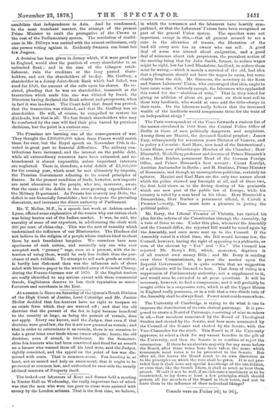The University of Cambridge is trying to do what it
can to improve the distribution of its own clerical patronage. It is pro- posed to create a Board of Patronage, consisting of nine members in all,—four members nominated by the Board of Theological Studies and elected by the Senate, and four more nominated by the Council of the Senate and elected by the Senate, with the Vice-Chancellor for the ninth. This Board is, if the University approves, to select a clerk for any vacant benefice in the gift of the University, and then the Senate is to confirm or reject the nomination. If there be no absolute majority for any name before the Board, after three votes have been taken, the name which commands most votes is to be presented to the Senate. But after all, this leaves the Board much to its own discretion as to the principles on which the vote shall be given. It is not pro- vided that it shall have any special knowledge of the candidates, or even that, like the Scotch Triers, it shall so much as hear them preach. Would it not be well, if so elaborate a machinery is to be constructed, to lay down at least a few principles which should govern all the members of the Board in their votes, and not to leave them to the influence of their individual likings?


































 Previous page
Previous page